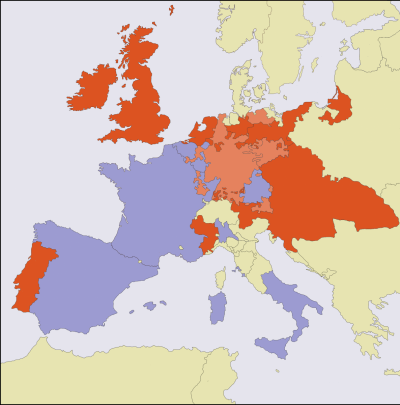The siege of Turin took place from June to September 1706, during the War of the Spanish Succession, when a French army led by Louis de la Feuillade besieged the Savoyard capital of Turin. The campaign by Prince Eugene of Savoy that led to its relief has been called the most brilliant of the war in Italy. The siege is also famous for the death of Piedmontese hero Pietro Micca.
By 1706, France occupied most of the Duchy of Savoy, leaving Victor Amadeus only Turin; on 19 April, Louis Joseph, Duke of Vendme, consolidated the French position in Lombardy by victory at Calcinato. Shortly afterwards, Prince Eugene resumed command of Imperial troops in Northern Italy, while Vendme was recalled to France in July, and replaced by the far less capable Duke of Orleans.
De la Feuillade began siege operations on 2 June but made little progress, while Prince Eugene out manoeuvred the French field army under Orleans, and joined forces with 7,000 cavalry led by Victor Amadeus. Despite being outnumbered overall, the Allies were able to concentrate their forces; on 7 September, they attacked the French south of Turin, and after fierce fighting, broke through their lines.
The French were forced to withdraw from Northern Italy, allowing Victor Amadeus to recover most of Piedmont, although his possessions north of the Alps were occupied by France until 1713. In March 1707, France, Savoy and Emperor Joseph signed the Convention of Milan, ending the war in Italy.
The War of the Spanish Succession (1701–1715) was a conflict involving many of the leading European powers that was triggered by the death in November 1700 of the childless Charles II of Spain. It established the principle that dynastic rights were secondary to maintaining the balance of power between different countries. Related conflicts include the 1700–1721 Great Northern War, Rákóczi's War of Independence in Hungary, the Camisards revolt in southern France, Queen Anne's War in North America and minor struggles in colonial India.
Although weakened by over a century of continuous conflict, in 1700 the Spanish Empire remained a global power with its vast dominions including the Spanish Netherlands, large parts of Italy, the Philippines, and much of the Americas. Charles's closest heirs were members of the Austrian Habsburgs or French Bourbons; acquisition of an undivided Spanish Empire by either threatened the European balance of power.
Attempts by Louis XIV of France and William III of England to partition the empire in 1698 and 1700 were rejected by the Spanish. Instead, Charles named Philip of Anjou, a grandson of Louis XIV, as his heir; if he refused, the alternative was Archduke Charles, younger son of Leopold I, Holy Roman Emperor. Having accepted, Philip was proclaimed king of an undivided Spanish Empire on 16 November 1700. The proclamation led to war, with France and Spain on one side and the Grand Alliance on the other to maintain the separation of the Spanish and French thrones.
The French held the advantage in the early stages, but were forced onto the defensive after 1706; however, by 1710 the Allies had failed to make any significant progress, while Bourbon victories in Spain had secured Philip's position as king. When Emperor Joseph I died in 1711, Archduke Charles succeeded his brother as emperor, and the new British government initiated peace talks. Since only British subsidies kept their allies in the war, this resulted in the 1713–15 Peace of Utrecht treaties, followed by the 1714 Treaties of Rastatt and Baden.
Philip was confirmed as king of Spain in return for renouncing the right of himself or his descendants to inherit the French throne; the Spanish Empire remained largely intact, but ceded territories in Italy and the Low Countries to Austria and Savoy. Britain retained Gibraltar and Menorca which it captured during the war, acquired significant trade concessions in the Spanish Americas, and replaced the Dutch as the leading maritime and commercial European power. The Dutch gained a strengthened defence line in what was now the Austrian Netherlands; although they remained a major commercial power, the cost of the war permanently damaged their economy.
France withdrew backing for the exiled Jacobites and recognised the Hanoverians as heirs to the British throne; ensuring a friendly Spain was a major achievement, but left them financially exhausted. The decentralisation of the Holy Roman Empire continued, with Prussia, Bavaria and Saxony increasingly acting as independent states. Combined with victories over the Ottomans, this meant the Austrian Habsburgs increasingly switched their focus to southern Europe.

1706Sep, 7
War of the Spanish Succession: Siege of Turin ends, leading to the withdrawal of French forces from North Italy.
Choose Another Date
Events on 1706
- 23May
Battle of Ramillies
John Churchill, 1st Duke of Marlborough, defeats a French army under Marshal François de Neufville, duc de Villeroy in the Battle of Ramillies. - 7Sep
Siege of Turin
War of the Spanish Succession: Siege of Turin ends, leading to the withdrawal of French forces from North Italy.

 English
English  español
español  français
français  português
português  русский
русский  العربية
العربية  简体中文
简体中文 